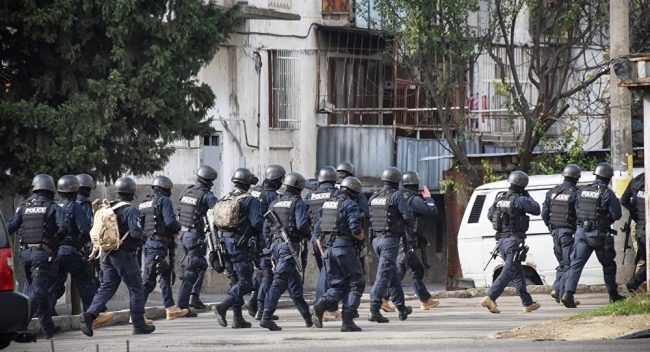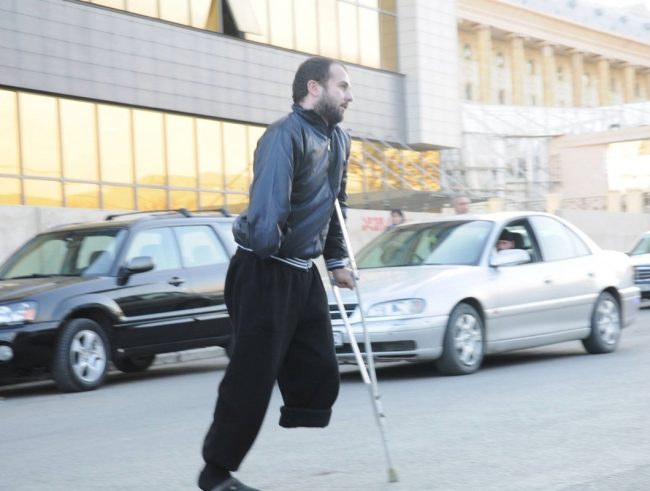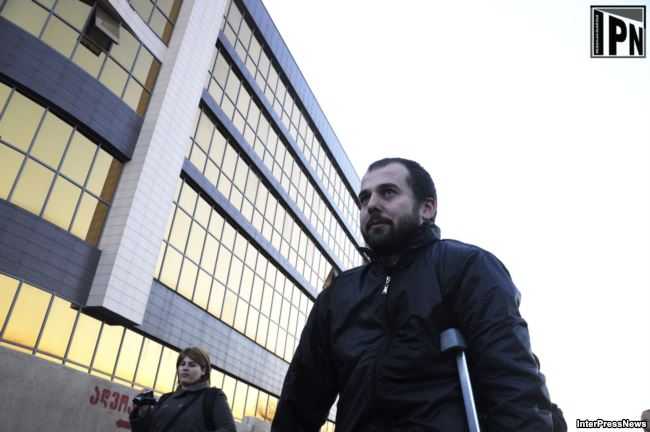

 On 22 November, in a special operation in Tbilisi, Georgian special services liquidated an armed group which included Akhmed Chatayev, also known as ‘one-handed Akhmed’. Chatayev was considered one of the leaders of the Islamic State. During the battle with Georgian special services he refused to disarm, and committed suicide by detonating a grenade. This is, perhaps, everything that is known from official sources about the operation in the Georgian capital, which lasted for almost a day.
On 22 November, in a special operation in Tbilisi, Georgian special services liquidated an armed group which included Akhmed Chatayev, also known as ‘one-handed Akhmed’. Chatayev was considered one of the leaders of the Islamic State. During the battle with Georgian special services he refused to disarm, and committed suicide by detonating a grenade. This is, perhaps, everything that is known from official sources about the operation in the Georgian capital, which lasted for almost a day.
Along with Akhmed Chatayev, several other people were staying in the ordinary flat in a large flat building in Isani District, in the Georgian capital. Witnesses — neighbours in the same section of the building and people living in nearby houses — say the tenants settled in the flat a few months before the special operation. When asked who these people were, they grudgingly answer: ‘ordinary, quiet, terse’. The number of people who lived in the flat is unknown. But according to the neighbours, it was always crowded: men came and went, a woman was often seen, perhaps, the wife of one of the lodgers, and children.
These people did not invite anyone in, and the neighbours, in turn, did not invite them. Relations between casual tenants and ‘indigenous’ tenants are usually like that. The guests, although they were not very talkative, occasionally exchanged a word or two with their neighbours. They did not hide their coming to Georgia from Chechnya, saying it was for business. Sometimes they said they came for medical treatment. Nothing could serve as a cause for alarm or surprise.
And yet, the conspiracy apparently did not work. According to the official investigation, surveillance of the Chechens began after one neighbour, an especially vigilant one, suspected something fishy and reported it to the police.
The flat where the taciturn tenants lived belonged to a Kist from Pankisi, Tinatin Gaurgashvili (Kists are a group of ethnic Chechens living in Pankisi Valley in the east of the country). Tinatin has lived in Austria for seven years, renting out her flat in Tbilisi. She learned that several people suspected of terrorism were barricaded in her flat only on the day of the storm, on 22 November.
After calling relatives in Georgia she found out that her daughter-in-law’s brother had let out the flat to a Chechen family with two children, who supposedly came for medical treatment. During the special operation, this man was taken to a police station and interrogated, but police decided not to arrest him. He has not disclosed details of his conversation with investigators, but considering he was released, it’s appropriate to suggest he was unaware that among the tenants was a wanted member of the Islamic State — Akhmed Chatayev.
One-handed Akhmed
Chatayev was born in 1980 in the Chechen village of Vedeno. During the second Russian-Chechen War, he lost a hand in battle. After the war, he left Russia and in 2003 received asylum in Austria. The Russian authorities called him a representative of [Caucasus Emirate leader] Doku Umarov, accused him of terrorism and issued an international warrant for his arrest. But they were unsuccessful in catching Chatayev. One-handed Akhmed, who easily travelled around almost the entire globe, was arrested in several countries, but released every time. The policemen waved their hands and pointed to the weakness of incriminating evidence: no proof — no guilt.

In 2012, Chatayev unexpectedly resurfaced in Georgia. He was detained by Georgian special services during the August special operation in the Lopota Gorge, in the east of the country. According to the official version of the investigation, the special services discovered and then rendered harmless a certain armed group. The Georgian authorities reported that the armed men had illegally crossed the border and penetrated the territory of the country from Daghestan.
Chatayev was in the thick of it all, although in truth, his role is still unclear. Yet, he was wounded and lost his left leg. At first, the Georgian authorities declared him a member of an illegal armed formation and locked him up. But he did not stay behind bars for long. While the investigation was still underway, parliamentary elections took place in Georgia. The Georgian Dream party won, and the new people in power called one-handed Akhmed a negotiator. He was released and allowed to leave the country.
By 2015 Chatayev was spotted in Syria, where he pledged allegiance to the leader of the Islamic State, Abu Bakr al-Baghdadi. Later reports stated that Chatayev headed the Yarmouk Battalion, and managed some ‘suicide brigades’. It is Chatayev the Turkish special services named as the possible organiser of the Istanbul Atatürk Airport terror attack in the summer of 2016. The attack killed 42 people. Chatayev was wanted by Turkey and the US, but he was once again found in Georgia, almost in the centre of the capital itself.
The operation
The counterterror operation on Gabriel Salosi Street in Isani District began late evening on 21 November. According to witnesses, the special services first tried to infiltrate the flat with a ruse. Several policemen dressed as civilians knocked on the door and introduced themselves as employees of the municipal services. But, apparently, it was not very convincing. Judging by how events developed, the tenants did not believe them and did not let them into the flat.
Negotiations began. While the policemen urged the barricaded militants to lay down their weapons, the Interior Ministry’s special services and the State Security Service (SSG) had surrounded the building and evacuated residents of neighbouring flats. The first shots were heard at about 04:00 the next morning. Despite meeting resistance, the special services continued their attempts to persuade the militants to surrender. At midday, the SSG reported their first arrest. It was Said Dudayev, a citizen of Russia [update: the man arrested later turned out to have misidentified himself. Shoaip Borziyev, a chechen who is on an Interpol list wanted by Russia on terror charges, and not Said Dudayev was arrested]. However, he was arrested outside the flat. Later Dudayev admitted to illegal possession of weapons, but still denied any connection to the people who were barricaded in the flat under siege. By the evening of 22 November, the authorities reported the conclusion of the special operation: three people suspected of terrorism were killed. One special service member was also killed.
The same evening, the first reports came out alleging the possibility that One-handed Akhmed could have been in the flat under siege. This claim was made, in particular, by retired Georgian Army colonel David Makishvili. Citing his Chechen friends in Austria, he said he had reliable information that it was Chatayev and his guards that were hiding in the Isani flat.
The same information was also spread by Georgian journalists, who cited their sources in state agencies. The authorities kept silent. And then, a few days later, the head of the SSG, Vakhtang Gomelauri, said that ‘Chatayev could have been one of the militants’. After a few more days, they finally admitted: one of those killed was indeed Akhmed Chatayev. They also said that he was not shot by police, but blew himself up with a hand grenade. As for the other two killed, their identities are still unknown. Representatives of the SSG have called on the public to wait for the results of the investigation, underlining that the American specialists from the FBI had joined the investigation. This was confirmed to journalists by US Ambassador in Georgia Ian Kelly. Following this, the SSG has not issue any other statements.
What was Chatayev doing in Georgia?
Georgian expert for the Caucasus, Aleko Kvakhadze, says that the information the SSG shares is scanty. After all, the authorities have failed to provide answers to questions of concern to Georgian society. Or they wished not to.
‘The appearance of Chatayev in Georgia raises many questions. How did he get here? When? What for? Theoretically, he could have landed in Georgia in two ways: somehow managing to slip over the border, or he was simply helped by someone — some official or even a whole department. But why? Any of these scenarios is bad because it shows that there are serious shortcomings in the Georgian security system. There is also the issue of armaments. Chatayev and his men were well-armed, which allowed them to fight with police for almost a day. If these groups had caches, this means they had some reliable contacts in Georgia. But none of them, as we see, was arrested’, Kvakhadze argues.
Representatives of the special services do not rule out that the militants were planning to organise an event to intimidate the population, or even a terror attack. For example, on the international economic forum Silk Road, which took place in Tbilisi at the end of November. Among the guests of the event were representatives of governments and business from around the world. According to some media reports, Chatayev had threatened Georgia previously.
Two years ago, while still in Syria, he allegedly sent a threatening audio recording to the Georgian authorities, demanding the release of Ayub Borchashvili, a former imam from the village of Jokolo in the Pankisi Valley. Borchashvili was arrested in June 2015 charged with involvement in a terrorist organisation, as well as recruitment and sending volunteers to Syria, including under-18s. The former imam has admitted to representing the Islamic State in Georgia, and was sentenced to 14 years in prison. However, Kvakhadze does not particularly agree with that there was a likely terrorist threat, or that Chatayev penetrated Georgia in order to avenge the former imam.
‘The most likely story is that Chatayev was intending to use Georgia to winter, when the field commanders usually go to ground. For example, in safe houses which they do not leave for months. As for what he was planning to do afterwards, we can only guess. Some say he was planning to move to Chechnya. Doing that in winter is indeed difficult, since the passes, as well as the approaches to them are covered in snow. But, on the other hand, for a person with two missing limbs, crossing the mountains is difficult even in the summer. It’s unlikely that Chatayev was planning a terror attack. Had he had such intentions he would have easily taken hostages in the multistory house that he occupied. I think he was trying to sit it out here for a while before finding a more suitable place to move’, the expert says.
Chatayev’s wife
Akhmed Chatayev’s widow, Aina Margoshvili, is a native of the Pankisi Valley. She was with her husband in Syria, and probably came with him to Georgia. Presumably, it was her the neighbours, speaking of a woman with children, had seen in Isani. And the Chechen who rented the flat without the knowledge of the owners also confirmed seeing a woman among the tenants. But after the special operation, Aina’s trail goes cold — she has disappeared. At first, she was allegedly seen in Pankisi. But Aina’s relatives, her mother included, have declared that she was not in her native village, which she had left a few years previously.
Later, there were rumors that Aina might be in Tbilisi with two, or even three militants, who allegedly managed to escape before the beginning of the special operation. The SSG have denied these rumors: neither Ayna, nor any escaped terrorists were in Georgia. Nevertheless, immediately after the special operation, the Georgian authorities closed the border to Russian citizens from Chechnya, Ingushetia, and Daghestan.
Residents of these three republics say that in the first week after the counterterror operation, everyone who tried to enter Georgia was told to go back by Georgian border guards. Chechens and Ingush who tried to leave the country at the end of November were subjected to close inspection on the border. Witnesses say they had the impression the authorities were strenuously looking for someone… But the authorities once again denied the reports they had closed the border for some people.
‘The work of the special services and the authorities in general, during the special operation and afterwards, provides grounds for some criticism’, says the founder of the Centre for Strategic Analysis, Nodar Kharshiladze. ‘For example, what causes confusion is an almost complete absence of information, even on issues that do not constitute secrets under the investigation, and require clarification from the authorities. As a result, the country’s leadership have pushed citizens to create conspiracy theories.’
He explained: ‘There are undeniable flaws which were detected during the special operation. I would note such problematic questions as coordinating actions between agencies during such emergency situations. However, it must be emphasised that the special operation ended with a tactical success, the group was neutralised. Accordingly, blaming the authorities for being unable to cope with threats would also be wrong. This was the first such case for the current government, and the final result is important here.’
The flat and the building where Chatayev and his entourage hid was significantly damaged during the special operation. According to the special services, the militants entered neighbouring flats to create space to manoeuvre. During the storm fires broke out several times, and the walls were damaged by gunfire and explosions (the militants were using grenades). Specialists inspected damages to the building for half a month, and closely inspected the condition of the Soviet era building. The assessment was that the building could be inhabited. It was renovated, and a month later the residents, who had been staying with relatives or in hotels paid for by the government, started to return. The flat where Chatayev lived his last days, has remained sealed. It’s not unthinkable that he could be buried in Pankisi. This wish has been expressed by relatives of his wife. The body of one-handed Akhmed might be given to them before the New Year, when the last investigative measures related to it would be finished. [As of 19 January, the authorities had still not released the remains of Akhmed Chatayev. OC Media has reached out to the SSG for comment.]
This article is a translation of a partner post written by Tamara Kavtaradze. The original version first appeared in the journal Dosh, issue 06/2017.







